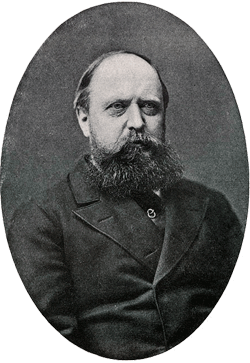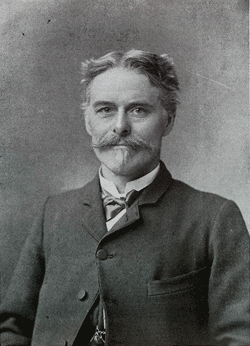Cope and Marsh
Today, needless anger. The University of Houston presents this series about the machines that make our civilization run, and the people whose ingenuity created them.
You and I encounter so much combat in the course of a day -- combat involving nations, friends -- even ourselves. More often than not, we wind up wondering where and why it originated.
 |
|
Othniel Charles Marsh |
Look, for example, at two American paleontologists who lived during the latter nineteenth century. They were Othniel Charles Marsh and Edward Drinker Cope. Marsh went to Phillips Academy and Yale; Cope was educated by the Quakers in his native Philadelphia. Both were very bright; both were abrasive.
After a three-year tour in Europe, Marsh taught at Yale for the rest of his life. He did field work in the American West, won medals, and he served as president of the National Academy of Science. He’s the person who showed that the horse evolved in North America.
Cope was born with a different kind of silver spoon in his mouth. He may’ve been less well-connected than Marsh, but he had a large inheritance. He took up paleontology, and used his fortune to support extensive fieldwork in the West. His fifteen hundred publications powerfully shaped American paleontology
So Marsh and Cope together established the field. They discovered and interpreted bones of all kinds of beasts. They perfected means for handling, classifying, and preserving them.
 |
|
Edward Drinker Cope |
Then, in 1872 when Cope was 32 and Marsh 41, Marsh questioned work that Cope had done in Wyoming. Cope reacted by going to war. Over the next twenty years the two cut and slashed at one other. For example, when Marsh became chief vertebrate paleontologist with the US Geological Survey, he froze Cope out from government support. Yet, when the dust cleared, each had made vast contributions despite assaults from the other.
Marsh was a superb collector and classifier. Even with his combative streak, he appears to have stayed clear of the noisy arguments over evolution. He simply accepted it as obvious. He was a good friend to both Charles Darwin and Thomas Huxley.
Cope may’ve had an equally short fuse, but he too entered the evolution debate methodically. His religious beliefs were no obstacle. Evolution had been evident even before Darwin proposed that it occurred through natural selection. But Cope believed it occurred by the inheritance of acquired characteristics.
At first he suggested that God explicitly directed the steps of evolution. Toward the end he tempered that, and suggested that humans, since they control their environment, also can influence their own evolution. While those ideas don’t survive, their usefulness in honing our understanding was huge.
So our understanding of our origins also evolved during the late nineteenth century -- bone on bone, idea yielding to idea. And at the heart of it were Marsh and Cope -- two superb paleontologists who, alas, could not stand one another. I need to remember their sad story every time I feel my own restraint beginning to slip away.
I’m John Lienhard, at the University of Houston, where we’re interested in the way inventive minds work.
G. B. Grinnell, Othniel Charles Marsh: Paleontologist. Leading American Men of Science, New York: Henry Holt and Company, 1910, pp. 283-312.
M. Benjamin, Edward Drinker Cope: Paleontologist. Leading American Men of Science, New York: Henry Holt and Company, 1910, pp. 313-340.
E. N. Shor, Marsh, Othniel Charles. Dictionary of Scientific Biography.Vol. IX (C.C. Gilespie, ed.) (New York: Chas. Scribner's Sons, 1971).
J. M. Maline, Cope, Edward Drinker. Dictionary of Scientific Biography. Vol. III (C.C. Gilespie, ed.) (New York: Chas. Scribner's Sons, 1974).